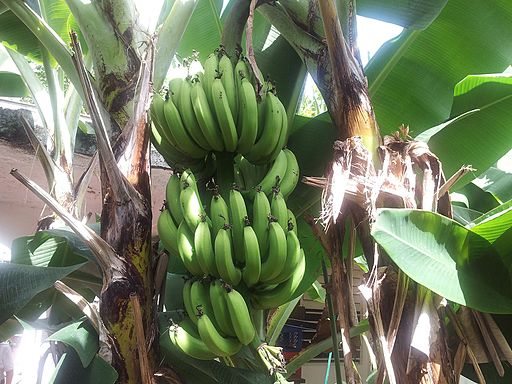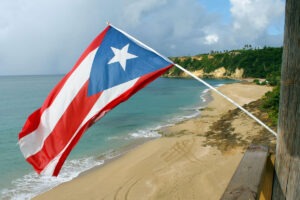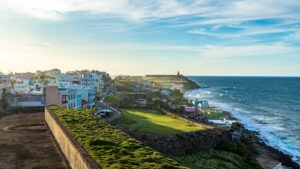
May 13, 2017; NPR
In spite of the dire situation in Puerto Rico as the government goes into bankruptcy and cuts back on education and social services, or perhaps because of it, the island is experiencing “a new wave of interest in food and farming.” This past weekend, it hosted Agrohack, “the premier ag-tech innovation summit for the advancement of agriculture as a sustainable source of growth and economic development in Puerto Rico.”
People are thronging to new farmers markets. Chefs are making a point of finding local sources of food.
According to Ricardo Fernandez, who is CEO of Puerto Rico Farm Credit, the largest agricultural lender on the island, it’s a dramatic break from Puerto Rico’s past.
“Historically, agriculture has had a stigma in Puerto Rico,” he says. “It was for low-end workers, people who didn’t get an education. We’re making it more modern, more hip.”
Agrohack organizers expect attendance to more than double this year, reaching 1,500 from last year’s 650. A press release states:
The agriculture industry in Puerto Rico has been in decline for 100 years, dropping from 71 percent of the gross domestic product in 1914 to less than 1 percent today. More than 80 percent of the food consumed on the island is imported when 90 percent of it could be locally grown. As a result, billions of dollars that could contribute to Puerto Rico’s economic recovery and stability are leaving the island to serve the economies of other countries.
[…]
The event will bring together international multi-disciplinary influencers of the industry ranging from techies, farmers, distributors, suppliers, retailers, government officials, transportation companies and the corporate sector that all have one goal in mind: to position Puerto Rico as the #1 destination for ag-tech development.
[…]
The conference’s agenda will be packed with talks on timely topics such as agribusiness, financing innovative agricultural projects, new farming methods, reducing imports and increasing exports, theft in farms, waste reduction, marketing for agriculture, and new agricultural technologies changing the landscape.
Puerto Rico has long had a dependence on imported food. Former Secretary of Agriculture Javier Rivera Aquino traces it to “the island’s long history as a Spanish colony, when native farming traditions gave way to large plantations of sugar and coffee that were shipped back to Europe. Food, meanwhile, was imported.”
Sign up for our free newsletters
Subscribe to NPQ's newsletters to have our top stories delivered directly to your inbox.
By signing up, you agree to our privacy policy and terms of use, and to receive messages from NPQ and our partners.
They were taught to produce what they don’t consume, and they were taught not to produce what they consume. That’s the kind of dependence that was created under that colonial system.
Puerto Rico’s sugar industry died out as producers in places like Louisiana became “bigger and more efficient.” That land is now owned by the Puerto Rican government and “still sits idle.” However, “the situation is now changing rapidly. Many consumers now are willing to pay extra for food grown on the island. University students are flocking to classes on agriculture.”
Fernandez said, “There’s a resurgence now, because we have to reinvent ourselves…Some entrepreneurs even see new chances to reverse the historical pattern, and export Puerto Rican food to the mainland U.S. and to Europe.”
However, the event is not without controversy. Puerto Rican organizations such as Siembra Tres Vidas (a small, local vegetable farm), Visit Rico (a local agrotourism business), and Para La Naturaleza (a local conservation charitable trust) issued a statement announcing that they are boycotting Agrohack because of Monsanto’s participation. The statement read (translated from Spanish),
Agrohack is billed as a conference designed to boost agriculture as a sustainable source of growth and economic development. It is a great contradiction that an event with this supposed purpose offers a forum to Monsanto to promote exactly the opposite.
Cobian Media, the organizer of the event, responded (translated from Spanish),
Agrohack was designed to unite all sectors of the agricultural industry, so that everyone involved in this field can work together to strengthen the segment and be more united. We firmly believe that the platform of diversity and inclusion is better for the island rather than one of exclusion.
Many international organizations, including the United Nations, assert that all countries should move away from monocultures and conventional practices if agriculture and the economy are to be promoted. This in turn will provide a greater variety of crops, reduce the use of agrochemicals, support small-scale farmers more, and focus locally on food production and consumption. We denounce that accepting the presence and allowing the dissemination of propaganda by multinationals like Monsanto/PRABIA is to validate its operation model and ignore its crimes against human health and the environment.
Nevertheless, Puerto Rican organizations continue to disavow the event.
Multiple farmers and local groups such as the Boricua Organization of Ecological Agriculture and Nada Santo About Monsanto, repudiated the event from its inception and others have been added, such as Sonia Carlo de Sana Farms, Department of Food and Slow Food Puerto Rico.
According to Fernandez, the new entrepreneurial ventures are still small. “From what we know, overall agricultural production is flat,” he [said]. But he expects that to change within a few years. “It’s at a turning point, but we need to do more.”—Cyndi Suarez












